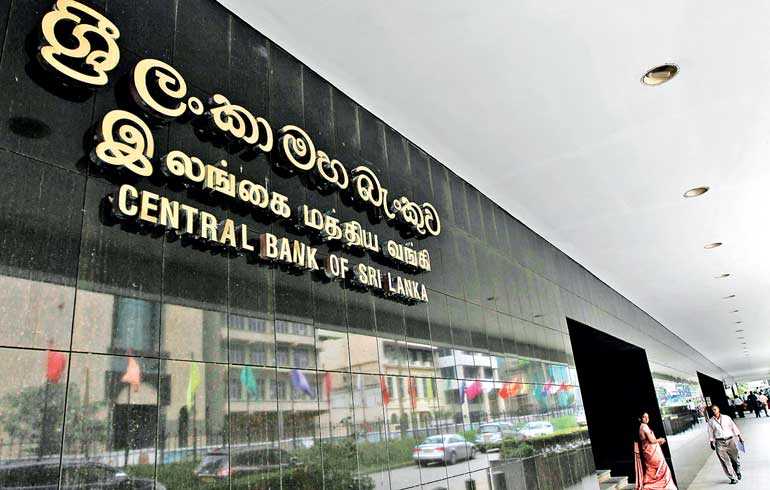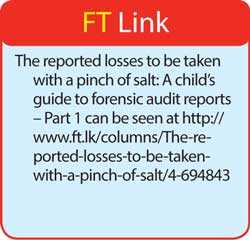Monday Feb 23, 2026
Monday Feb 23, 2026
Monday, 10 February 2020 00:08 - - {{hitsCtrl.values.hits}}

When EPF was created in 1958, the Bandaranaike Government faced the problem of finding a trustworthy governmental body to hand over the management of its funds. It finally zeroed on the Monetary Board of the Central Bank
Asani, the bright AL student, and her grandfather – Sarath Mahatthaya – have been having frequent intellectual discussions on issues of mutual interest. Last week, they had a similar dialogue on the forensic audit reports completed by two audit firms of international repute – BDO India and KPMG India – on the bond issues by the Monetary Board of the Central Bank from 2002 to April 2016. In this discussion, Sarath Mahatthaya had pointed out to Asani that the loss calculations done by BDO India have been defective since they had used a fictitious price and wrong methodology to do the job. Though ‘forensic’ means that the findings in the audit could be used as evidence in a court of law, because of the defects in the calculations, they were a misfit to do the job. Meanwhile, quoting the audit reports, many had started loud rants about the irregularities in the Employees’ Provident Fund, commonly known in its abbreviation as EPF. Asani wanted to get her Grandpa’s views on this issue.
Asani: Grandpa, of late, many have started demonising EPF for losing the monies belonging to members through fraudulent investments. They have named some devils in EPF in both pre-2015 and post-2015 periods. Their source is the recently-released forensic audit reports completed by the two international audit firms of repute – BDO India and KPMG India. Is there any truth in these allegations? Had EPF been a den of devils as they had claimed?
Sarath Mahatthaya: This is a recent story. Throughout EPF’s history, it’s been run by men and women of honesty. When the Central Bank came under LTTE bomb attack in 1996, EPF lost everything. Its accounts, records and even the people. Yet, the heroic survivors who refused to accept defeat rebuilt it on modern lines in trying conditions. They could have stolen its funds easily. But they protected it as if their own life. When some greedy devils tried to steal its monies, they were unceremoniously sent home. All at EPF are not devils. There’re a few who have committed fraud. It’s filled with honest men and women. It’s unfair to brand them as rogues. 
A: You said earlier that it was a mistake to place EPF under the custodianship of the Monetary Board because it entailed a conflict of interest. The Monetary Board has to give us an inflation free world and a stable financial system. When it seeks to attain those two objectives, it cannot surely ensure the highest rate of return to EPF members. Then, what was the reason for placing EPF under the care of the Monetary Board?
S: When EPF was created in 1958, the Bandaranaike Government faced the problem of finding a trustworthy governmental body to hand over the management of its funds. It finally zeroed on the Monetary Board of the Central Bank. But the first Ceylonese Central Bank Governor, the late N.U. Jayawardena who was a Senator at that time, made the strongest objections to the proposed arrangement, citing exactly the conflict of interest you have mentioned. He pleaded that the Government should not reduce the Central Bank to the status of a Government department by assigning EPF to it. He was pacified by Prime Minister Bandaranaike that it was just a temporary arrangement and the Government would soon go for a permanent solution. But he didn’t keep his promise and that temporary thing has now become a permanent one. So, it’s unfair by both the Monetary Board and by the members that EPF is kept under the Board’s care.
A: What it means is that the Monetary Board is an unwilling custodian. But as you have said, it has done a reasonably good job in the past. Can anyone therefore make charges against the Board?
S: The Board is required to invest the funds belonging to members which are not immediately needed for payment of benefits in securities and sell those securities in the market if it thinks so. But all those investments are choices that we make without knowing exactly what would happen in the future. Economists call this ‘choices made under uncertainty’ and we know through practical experience only a few of those choices will become successful. As such, if future developments go against us, those choices would result in failure leading to losses. But we can talk bravely about those failures only after the event has taken place or in hindsight. No one has foresight to say so before the event. This is exactly what has happened to the Monetary Board today because the critics have the benefit of the hindsight whereas the Board could not see to them with foresight.
A: It’s surely unfair to blame the Board if any investment decision it has made has gone wrong. But isn’t there a way out?
S: Fortunately, the Parliamentarians in 1949 who enacted the Monetary Law Act or MLA establishing the Central Bank and those in 1971 who amended the EPF Act were a wiser lot. They had freed the Monetary Board as well as the servants of the Central Bank from responsibility under both legislations for any genuine mistake they may have made in carrying out their duties. This has been provided for in Section 47 of MLA and endorsed in Section 5(2) of EPF Act in an amendment done in 1971. They had gone even further. Parliament has directed the Central Bank to indemnify Board members and central bank officers for any loss or damage caused by their genuine work. But that does not cover any damage or loss due to misconduct or wilful default done by either party. But that has to be proved in a court of law and you can’t just hurl accusations against them.
A: But Grandpa, haven’t forensic auditors noted that provision? If they knew of it, surely they would have thought twice before writing what they have written in the reports?
S: BDO India in their reports 2 and 4 have touched on the investments made by EPF in Treasury bonds. KPMG India has dealt with EPF’s investments in the share market in report 3. But none of these reports bear evidence that they have been aware of these special provisions made by Parliament. Hence, it is up to the current Monetary Board to make the distinction between genuine mistakes and those that have been made through misconduct or wilful default and make a public announcement exonerating the first category. If there is any loss or damage done genuinely, the current Board should make the announcement that it would indemnify those losses or damages. In the absence of such an exercise by the current Monetary Board, all those who have served the Board and the Bank are branded as rogues in the eyes of the public which is unfair. No one would serve the Board or the Bank in those circumstances. The Parliamentarians in their wisdom in 1949 and in 1971 made those provisions to protect the Board members and Bank officers who do a genuine job of work. It is essential to induce them to serve on the Board and work in the Bank, respectively.
A: I can now understand that Parliamentarians in those days were a much wiser lot. They were fully aware, it appears, that making investments was not an easy job. You can make mistakes when making investment decisions. But if you are not protected, you would not make those choices. Therefore, EPF is bound to make losses. Grandpa, what are the arrangements that have been placed by Parliament to absorb losses?
S: EPF is a peculiar creature and many in Parliament or those engaged in media or even EPF members do not appear to have understood it. This applies to forensic auditors too.
EPF, as it has been created by Parliament in 1958, is an open-ended mutual fund. The specific feature of such a fund is that when members join, the fund increases. At the same time, when members withdraw their balances from the fund, it shrinks.
This is further complicated because there is no capital that has been given to EPF by the Government or any other authority. Today, it is worth of Rs 2.4 trillion. But it has no capital and if there is a loss due to any reason, genuine or otherwise, the full loss has to be passed onto the members. You will therefore see that the job of the Monetary Board is more complicated than what it appears to many of those outside the Bank. It is caught up in a dilemma. If it wants to increase the return to members, it has to make risky investments. But those risky investments will end up in losses which without a capital has to be passed fully onto the members. This is the paradox of making investments.
A: Isn’t there a way to resolve that paradox, Grandpa? Surely, many investors in the market may be facing the same paradox?
S: Not the sophisticated investors, Asani, even the simple village Sillara Kada Mudalali would know how to resolve that paradox. Look at that sideway grocery store. There, the Mudalali may make losses from coconuts but it doesn’t mean that he is a failure. He will try to make profits from another grocery item and if those profits are bigger than losses, he can still continue to be in business. What it means is that there is no need for him to make profits from every item he sells. If his overall trade results in a profit, he is well protected. 
In the case of sophisticated investors, this is known as ‘portfolio investment’. A portfolio is simply a collection of various types of investments. In order to bring down the risk of investment, the investor is required to diversify his portfolio among as many investments as possible because the golden rule tells him that ‘he should not put all his eggs in a single basket’. An investor cannot ensure that all his investments should make profits. It is against reality. Hence, what he tries to achieve is the profits from the overall investments. He may make losses here but if the profits there are bigger, he is fully covered. This is the challenge faced by the Board and the Parliamentarians in the 1950s and ’70s fully understood this challenge. That is why they put into law that genuine mistakes should be tolerated.
A: I can understand that making losses is natural and it has to be tolerated. But in the absence of capital there is no protection to EPF members. Don’t you agree, Grandpa?
S: Asani,our Parliamentarians in those good old days were wiser in that respect too. In an amendment to EPF Act in 1971, they have authorised the Monetary Board to establish reserves out of the earnings of the Fund to meet unforeseen emergencies or the decline in the market value of its investments. This is provided for in Section 5(1) kk of EPF Act. The Board did not venture into creating those reserves in the initial period of EPF’s operations. But, as a part of the Central Bank’s modernisation program in 2005, the Board created a special profit equalisation reserve out of the Fund’s earnings in that year. Every year since then, this reserve was built up by transferring funds out of current earnings. In the absence of an originally supplied capital to EPF, these reserves today constitute a capital that has been created out of retained earnings. As a result, losses can be absorbed by EPF up to the value of the reserves without passing them on to members.
A: It’s a wonderful decision made by the Monetary Board, Grandpa. I know in the case of banks, capital protects the depositors up to the value of the capital. Is there any similarity in EPF too?
S: For your benefit, I have made some calculations based on what has been revealed by EPF in its Annual reports. Those reports are available only up to 2016. We can’t compliment the Monetary Board on that count.
Banks have to maintain capital as a percent of their risk weighted assets. Since the Government securities constitute an absolutely risk-free investment, the risk weight given to them is zero. But there is a market risk faced by the Monetary Board if the securities which it has earmarked for trading, known as the trading basket, experience a decline in the market prices. In terms of the accounting standards, the Board has to mark them to the market value every year and if there is a decline in the market value, charge that loss to the current earnings.
Historically, the annual market price variation of Government securities held by EPF has been less than 10%.
Hence, I have assigned a 10% market risk to that basket. But the investments in the share market, the variation has been more in certain years. Therefore, I have assigned a risk weight of 50% to EPF’s investment in shares.
The total reserves in EPF at end-2014 amounted to Rs. 41 billion. It was 67% of the risk weighted assets. Since then, the Monetary Board, quite correctly, has used some of the reserves to pay annual interest to members. As a result, the reserves have fallen to Rs. 31 billion by end 2016. But as a percent of risk weighted assets, it still amounts to 44%. This level of capital is pretty much higher than banks which should be around 13%.
Hence, the Monetary Board has very prudently maintained the safety of the funds belonging to members. Unfortunately, the forensic auditors have not noticed this.
A: But Grandpa, the forensic auditors have come up with a loss of some Rs. 8.7 billion to EPF as a result of selling bonds what they call below the previous week’s weighted average yield rate in the secondary market. How do you reconcile this?
S: It is another instance where auditors have displayed their ignorance in the Treasury bond market and how EPF keeps its portfolio. The secondary market price in the previous week is just an average and the actual prices have moved in a wide range. It is therefore misleading to compare the yield at which you have bought with that average price. It doesn’t tell you anything whether you have made a profit or a loss. What matters to EPF is whether these investments are kept by it till they mature. EPF has mostly bought bonds at a price below the face value and when the Public Debt Department pays the face value on maturity, EPF gets an additional income. About 98% of the EPF’s Treasury bond portfolio is held to maturity and therefore, every year, EPF has earned an income called amortisation gain in the region of Rs. 28 billion. Thus, there is no loss and the forensic auditors have simply misled the current Monetary Board.
The auditors have failed to understand the mandate given by Parliament to the Monetary Board. The Board has to balance three conflicting objectives. On one side, it has to deliver an inflation-free world supported by a stable financial system. Then, it has to raise debt for the Government at the lowest possible cost. On top of these two objectives, the Parliament wants the Board to pay the highest return to EPF members. Hence, the Board’s job is like that of an acrobat who walks on a tightrope. It is a balancing act and if the Board tilts to this side or that side, it will fall off the rope. But fortunately, Parliament has accepted that the Board and the Bank officers can make genuine mistakes and provided not only for the toleration of those mistakes but also for the indemnification of the any loss or a damage. The strange thing is that if there are losses as reported by forensic auditors and if these losses have arisen out of genuine mistakes, the Central Bank has to make good those losses as per the wish of the Parliament.
A: But Grandpa, it is not a licence for the Monetary Board or the officers of the Bank to get involved in a misconduct or do a wilful default.
S: Exactly. In the case of those who have done so in the past, law enforcement should be applied strictly. But it is necessary to prove that there is a misconduct or wilful default on the part of the Monetary Board or the officers of the Bank so named. As I told you earlier, with regard to the Monetary Boards in the past, this is the biggest embarrassing job which the current Monetary Board has to perform.
A: Thanks Grandpa for the elucidation. I’m now wiser than before.
S: (Laughing) I hope that you’re as wise as the Parliamentarians in 1950s and early ’70s.
(The writer, a former Deputy Governor of the Central Bank of Sri Lanka, can be reached at [email protected].)